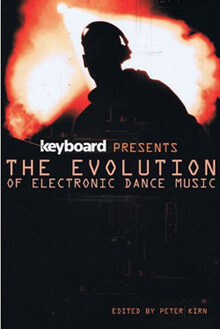Keyboard magazine’s repackaging of some of its finest articles offers a series of intriguing insights into the rise and rise of electronica, writes Greg Scarth.
 Since the third century BC, historians have sought to understand artists’ creative processes and explain the meaning of their art. From the writings of the ancient Greek Xenokrates and Pliny the Elder’s Natural History through to the modern academic world, Western culture has displayed an obsession with exploring and understanding every form of artistic expression.
Since the third century BC, historians have sought to understand artists’ creative processes and explain the meaning of their art. From the writings of the ancient Greek Xenokrates and Pliny the Elder’s Natural History through to the modern academic world, Western culture has displayed an obsession with exploring and understanding every form of artistic expression.
With electronic music now well into its fourth decade, it seems only logical that its critics and historians should also attempt to formulate a definitive history of the genre. The Evolution of Electronic Dance Music is an anthology of interviews taken from the archives of Keyboard
Magazine and Remix. Editor Peter Kirn, best known to blog regulars as the man behind Create Digital Music, has selected a broad cross-section of articles which represent a wide range of electronic music styles.
The book makes no attempt to offer a comprehensive, encyclopedic account of electronic music’s development, but every generation is represented in some form, from the godfathers (Kraftwerk, Depeche Mode), and established legends (Juan Atkins, Daft Punk) all the way through to contemporary artists including Flying Lotus and Robert Henke.
Don’t make the mistake of thinking that this is simply an opportunity for Keyboard to cash in on repackaging content from back issues. The selected articles offer genuine insight into the development of the electronic music scene, both in terms of the processes involved behind the scenes and in terms of artists’ philosophies and motivations.
Coming from Keyboard‘s archives, the content is at times unashamedly technical. Juan Atkins is happy to talk at length about the essential gear in Detroit studios during the birth of techno, specifically praising the Yamaha DX100 over the DX7 for its fatter sound. In a 1997 interview, a remarkably candid Richard D James chats openly about writing his own DSP algorithms for the latest Aphex Twin live tour.
In some ways, The Evolution of Electronic Dance Music could be taken as a unintentional companion piece to Chris Kempster’s 1996 History of House, a long-out-of-print volume gathering together interviews from The Mix magazine. The crucial difference between the two books is context. Kirn’s book offers the benefit of fifteen years’ further hindsight, giving, as the name suggests, the chance to step back and take a look at the bigger picture.
In a 1997 interview with the Chemical Brothers, Tom Rowlands asserts that “the good thing about this kind of music [is that] you don’t need all this great equipment… You can just go to your bedroom and make it.” Photos of Tom’s setup from 2011 suggest that, 14 years on, maybe his definition of a bedroom studio differs slightly to ours.
Minor ironies aside, it’s interesting to note just how many of these interviews remain totally relevant to producers today. Even in 1995, Juan Atkins can be found warning against the complacency of producers relying on presets. Meanwhile, Richie Hawtin’s 2001 pronouncement that “the people who are really pushing it are the people who do a hybrid between live performance and DJing” seems all the more prescient given his own efforts to stage increasingly fluid live performances over the last decade.
The Evolution of Electronic Dance Music may not be the definitive guide to the development of the genre, but as a series of snapshots it offers an intriguing look at the way dance music culture has progressed over the last thirty years.

08.35 PM
Woot asking Santa for this. I will pay $$$$$ for Aphex Twin words.